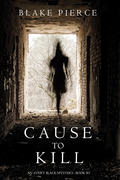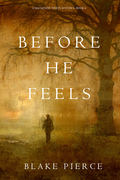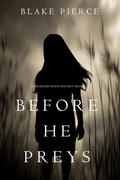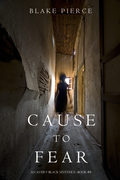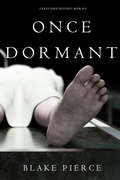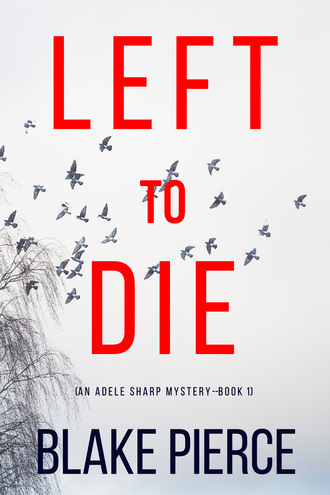
Блейк Пирс
Left To Die
CHAPTER SIXTEEN
The cool breeze introduced itself to the night with gentle swirls, brushing against leaves and sidling along buildings down the cramped street. Enes made his way, stumbling a bit on the stone curb. In the distance, he spotted a police car pulling by, lights flashing.
The man puffed his cheeks, breathing in quiet relief. “Stupid Peter,” he murmured. He was glad he’d turned down the ride from his dorm mate—five drinks in and still behind the wheel.
Still, prudent decisions did little to stave off a nip in the air, and the young man wished he’d brought a jacket. He’d left his umbrella back in Peter’s car, but thankfully the rain seemed to have stopped, at least for the hour. He shivered, rubbing at his arms as he made his way along the street.
Enes glanced back in the direction of the bar and blearily surveyed the glowing orange and yellow lights emanating from the streaked windows. He could hear the raucous cries of people reacting to the football match, and, perhaps, to the magician. It hadn’t been a very good magician. The trick with those twenty-three cards had been easy enough to spot. An engine, in statistical parlance, where no matter what, a chosen card would be revealed after a series of mathematical estimations.
The university student shook his head and pulled his shirt collar over his ears for a bit of warmth. He rubbed his arms a second time.
Normally, walking through the parks at night, especially in Paris, was an ill-advised option. But it was just so cold. He didn’t want to circle the park to reach his dormitory. Besides, it wasn’t like he was some defenseless child, worried about being attacked. He could take care of himself.
Enes jutted his chin forward and nearly slipped off the curb as he took another step. Quickly, with a spring, he righted himself, testing his suspect foot. He winced.
Through the tingling pain, Enes paused, teeth still clenched. Behind him, for a moment, he thought he heard footsteps.
Uttering a string of expletives, he glanced back, but spotted no one.
The row of parked cars glinted beneath the moon, winking ominously at him. Still cursing, he jerked his foot back onto the sidewalk, testing it gingerly. Then, with added respect toward the alcohol cycling his system, he began to move toward the park.
There had been a killing in Paris not long ago. It had made the news. But it was on the opposite side of the city, nearly an hour and a half away in bad traffic. He figured he would be fine.
Enes reached the park and scanned the darkness. Safety lights flanked the trails, illuminating the waving trees and the vegetation responding to the influence of the wind.
He wished he’d carried a knife. Still, it was only a short walk to the other side of the park, and then he’d be within sight of his dormitory.
Again, for a moment, he had the uncanny feeling of being watched. The back of his neck prickled, and he turned, peering across the park once more.
Still, he spotted no one. For the faintest of moments, he reconsidered the trip through the park. The place was notorious for muggings and worse, but even muggers didn’t like the rain.
Enes lowered his head and began to limp through the park, keeping quiet, his arms at his side, as if presenting as small a target as possible would allow him safe passage beneath the shadowed trees.
At this point, everything seemed quieter. Living in a city like Paris—a beautiful, messy, loud city—one could forget what quiet was. Even at night, the sound of passing cars and the noise from the apartments or bars would taint the air. The park, though, while not entirely removed, was still spacious enough and serene enough that Enes thought he could pick up the quiet buzz of the safety lights.
Then he heard footsteps.
A chill crept up his spine, prodding at him like fingers of ice. He turned sharply and spotted someone coming rapidly toward him.
For a moment, he felt a flood of fear. He tried to break into a sprint, but found his twisted ankle wouldn’t hold his weight. He stumbled and quickly righted himself, turning once more to face the oncoming person.
As the stranger in the dark drew nearer, Enes’s breathing eased.
It was the magician from the bar.
The young man muttered beneath his breath, allowing a sardonic smile to twist his lips. He felt silly all of a sudden, reacting as he had. The tourist with the thick accent had been annoying, but clearly nonthreatening.
Enes shoved his hands in his pockets, refusing to return the small wave flashed in his direction from the magician.
“Excuse me,” said the tourist, his accent grating.
“You shouldn’t sneak up on people,” Enes snapped. Some of his friends liked to slow their speech when speaking to tourists. It allowed the foreigners to understand better. But he had no such aversions to rapid cadence. Tourists, as far as he could tell, were a bane on the city. They robbed Paris of much of its identity.
The magician continued to approach, smiling genially. He had a wool cap pulled tight over his head with stray strands of reddish hair poking out from beneath the hem.
“You forgot something,” said the magician.
Enes frowned. Instinctively, he checked his pants pocket, but his wallet was still there. He glanced back at the tourist and shook his head.
“Come with me,” said the stranger. “I left it back over on the trail by accident.”
Enes scowled now. He didn’t like this tourist, and he didn’t like that he’d been startled at night in the middle of the park. He glanced around and thought he spotted a couple teenagers on a bench in the distance. But they weren’t looking his way.
“Go away,” he said.
“Come, you forgot something. Your wallet. It’s just back that way.”
Enes checked his pocket again, this time pulling his wallet out enough so he could glance at it. He opened it slightly and spotted all his cards and the ten-euro note he’d expected.
He shook his head. “Not mine,” he said. “Go away.”
The magician had stopped, both his hands out of sight behind his back, a quizzical expression on his face. “You really are twenty-three? What’s it like?”
This took Enes off guard. Now, part of the earlier fear had returned, once more circling his system. Perhaps he’d been too quick to dismiss the threat presented by this tourist. He began to turn to walk away, limping along quickly, heading toward the opposite end of the park.
He continued to glance back, refusing to leave the strange, creepy man out of sight.
“It must be nice,” the magician said, following in his footsteps, moving quickly, but confidently. Like a predator stalking its prey. “Youth is wasted on the young. I’m only a bit older than you. Look at me; can you guess how old I am?”
Enes shook his head wildly, and began glancing around for a tree branch or some rock he could use as a weapon.
“I’m only forty,” said the magician. “But I don’t look much older than thirty-two, do I? That’s what my friends say. I’ve had a lot of work done.” He laughed in a would-be disarming manner.
The young man felt anything but put at ease. He felt a hand suddenly reach out and grab his wrist, gripping him tight and sending his heart catapulting into his throat.
Enes caught a wicked gleam in the magician’s eye, followed by the flash of something metallic as the tourist’s other hand came darting forward.
A needle. Enes shouted and swung a wild punch, which missed the magician, but did enough to knock off his aim. The twenty-three-year-old turned and tried to sprint away, but again his ankle failed him.
Now, the tourist snarled and lunged after him.
Enes kicked, bit, and scratched, trying to go for the magician’s eyes. But the tourist held on tight; there was a pause, a quick grunt, and Enes felt a sudden sharp jab of pain in his waist. He glanced down, realizing suddenly that he somehow found himself on the ground in the dirt with the magician above him.
A horrible, pale little syringe was stabbed into his hip. The plunger had been pressed.
Enes stared, stunned. Then he tried to rise. A second passed… two… His arms felt funny.
The magician emitted a cooing sound and reached down to caress the young man’s hair in tender, affectionate strokes.
Another chill crept across the college student’s skin. But, just as quickly, the sensation up and down his spine faded. He tried to regain his feet, but found they wouldn’t move either.
Had he broken something in the fall? Terror filled him. A childhood spent playing sports, fearful of injuring his spine, flooded his mind. But, as he tried to speak, he found his lips wouldn’t move either. His arms hung limply at his side like wet strands of pasta. He could hear, see, he could feel the dirt trail pressed against his chest and cheek. He could feel the sharp pain now, returning to his side. His senses, if anything, seemed heightened. The magician was twisting his arm, evoking further pain as he tried to roll his prey over.
Enes wanted to resist, but his muscles, his tendons, his limbs didn’t respond. He could feel, but he couldn’t move.
Now fear pumped through him, swelling his system with adrenaline. But the adrenaline only stirred him to more anxiety. The adrenaline wasn’t being used; it had nowhere to go. He was helpless.
He tried to scream, and he could hear the shout, the bloodcurdling screech in his own mind, but there, beneath the moon-laced tree branches, staring up at the dark sky, he heard nothing. His lips remained numb.
He saw a glint of something metal, and then a muttered oath. The magician was shaking his head and murmuring something to himself in a language the young man didn’t understand. The tourist grabbed his victim by the wrists and began to drag him roughly along the trail, toward a darker portion of the park.
“Have you ever heard of the Spade Killer?” said the magician in a low voice, grunting in between the words. “He once created artwork in a park too. Not this one, but close enough. I must thank you for leading me here. It’s fate.”
Enes couldn’t respond. He could feel dirt getting into his shirt though, scraping against his back as he was dragged along the path. Somehow, the sensation was double. The pain in his shoulder sockets worsened, the rash along his back rubbed with dirt and gouging rocks.
He felt himself deposited unceremoniously beneath a dark tree.
Above him, he glimpsed another flash of metal. The magician was holding a small knife. He stared down at the young man, a tender expression on his face. He stooped, still smiling, and removed Enes’s shirt. The college student couldn’t resist; he couldn’t fight.
The magician loosed a shuddering gasp, an orgasmic sound. He studied his victim’s exposed chest. “Where to start?” he said. “Twenty-nine was too old. This park—it’s funny we should be here. Not far from here, in another park, the Spade Killer had his first. She was forty-one, you know? Twenty-three, forty-one. The numbers both add up to five—get it? That’s where he started. He stopped at thirty—imagine that? Forty-one to thirty. The authorities don’t even know all of his tapestries. I picked up where he left off. You’re just a youthful piece to a grand tapestry. I once had a body like yours, you know? I still do. Look.”
The magician lifted his shirt, revealing a trim, pale body, and he seemed to flex his abdomen, trying to press his muscles against his skin. The vanity and the terror of the moment mixed, settling on Enes’s helpless form like a smothering blanket.
“Rock hard,” said the magician, slapping at his abdomen. “And the work,” a long, pale finger traced his cheeks. “Most people can’t tell it’s professional.” He reached up, prodding at his nose and beneath his eyes. He smiled down at the shirtless victim. “This is going to be fun. Please, whatever you do, don’t scream.” He chuckled at this. “Not that you could…”
Then the knife flashed forward, descending toward Enes’s chest.
Voices exploded from behind them.
“You! What are you doing with him!”
The magician froze, a horrified look curling his features, his leering grin morphing to a wide-eyed look of fear.
Hope surged in Enes’s chest. He wanted to cry out, to plead. But the words wouldn’t come.
“It’s nothing,” said the magician, keeping his face forward, refusing to glance back toward the sound of the voices.
Enes thought of the teenagers he’d spotted on the park bench. Perhaps they had noticed him. He’d never much liked teenagers in recent years. They were notorious for leaving glass bottles around the park or vandalizing the statues.
“What are you doing with him?” came an angry voice.
“We’re in love,” retorted the tourist. “Leave us to our privacy!”
“Hear that?” said a second voice. “I told you not to bother them. Pervert.”
The first voice, though, didn’t seem convinced. “He’s not moving. Look at him.”
“It’s fine,” said the magician, still stiff, frozen, staring ahead. “Go away. It’s been a long day for him. This isn’t something your parents would want you to see. It’s a private thing. You’re being rude.”
A couple of voices were snickering now, giggling to each other at the tourist’s words.
Enes felt terror coming back. Hope fading. Would the teenagers leave? The magician was convincing, and had even leaned down to tenderly caress the young man’s chest. The giggling voices seemed convinced.
The sound of dirt scraping beneath shoes reached Enes’s ears. “Sorry, sir!” called one of the teens. “We’re going.”
But the first voice retorted, “I don’t believe you! You have a knife in your hand. Look—it’s a knife! We’re calling the police!”
At this, the magician gave up all pretenses. He cursed and shoved roughly off the young man, pressing hard against his chest for leverage, and then he bolted in the opposite direction of the voices, fleeing into the trees.
“Sir, help is coming. Are you hurt?”
Two faces, then a third crowded above him. Enes spotted phones pressed against each of the teenagers’ cheeks, but though he tried to react, tried to speak, he found he still couldn’t move a muscle. Still, tears of sheer gratitude traced the inside of his face and tickled the underside of his chin.
CHAPTER SEVENTEEN
The gated mansion loomed over Adele, its shadows sweeping the well-maintained streets of the cul-de-sac. Her breath plumed into the night, twisting toward the sky in foggy ribbons. Adele paused for a moment, checking her watch. Exactly one hundred. The small symbol of a heart on the smartwatch pulsed next to the steady number.
The skies were still of dark countenance, and sheets of still quiet draped the streets—especially in the upper end of the Parisian suburbs.
Adele pushed a few strands of hair back behind her headband, clearing her vision. Normally, she never broke routine. But sleep had played coy with her, and Adele had needed to clear her head. Running along the empty sidewalks at night had been refreshing. She needed those lab results; but it would take time…
Time she didn’t have to waste.
A light switched on in the white-bricked mansion, beaming out through a multifaceted atrium window and swaddling vanity pillars stretching the yard.
Another flood of memories bubbled up. She smiled through the gate, toward the light, sourced by the only other person she knew in France who kept horrible hours. When she’d been younger, many of her nighttime runs had ended up outside this place.
Adele winced against the glare of the light, and then flinched as the gate suddenly opened, splitting in the middle and swinging inward with the quiet, churning sound of an electric motor. Adele glanced up the long driveway toward the house.
Again, she was filled with memories of her time in France when she’d first joined the DGSI. Smiling to herself and attempting to push aside thoughts of the case, of the tox report, of the ticking time, she broke into a jog up the trail and toward the mansion.
The door swung open as she ascended the patio steps.
Robert stood in the doorway, wearing fuzzy pink slippers and a luxurious silk robe.
“Were you up?” she asked, breathing heavily between her words.
Robert lifted his right hand, his thumb pressed between the pages of a book. “Just doing some reading. Come in.”
Adele hesitated, glancing over her shoulder. She had lived at Robert’s mansion for a year last time she’d been in France. She didn’t know why a man who’d inherited so much worked for a government agency, especially as it wasn’t the kindest of jobs, nor did it facilitate interactions with the most pleasant of people. If Robert had wanted to, he didn’t have to work a day in his life.
Then again, perhaps that’s what he feared.
She shut the door behind her as she entered the pristine marble and tile atrium. In her estimation there were far too many statues and paintings adorning the area, not to mention the overly resplendent chandelier dangling from the ceiling. But taste was a matter of preference, and Robert’s tastes were more high-minded than most.
The small man stepped quietly across the tile floors in his fuzzy slippers, leading her through a side door and into a study, entirely unperturbed by her unannounced visit. In the study, a slow fire crackled behind a grate, and a couple of red chairs faced the flames. Robert plopped down in the seat on the left.
In one corner of the room, a dusty billiards table lodged between a bookcase and a wall. The pool cues were also covered in dust and stood unused in a rack by the table.
The house was large, and though there were two chairs, Robert lived alone. He’d never been married, and had never had kids of his own. He’d been brought up in a generation where his preferences in a romantic partner had not been smiled upon.
Adele’s breathing quieted and her heart rate calmed as she approached the fireplace, feeling the warm pulse of the flames as they crackled in the hearth. Robert propped his feet onto a footstool and leaned back, melting into his red chair with a look of contentment on his features.
“Sit, please,” he said, waving a small hand toward the empty chair. “Couldn’t sleep?”
Adele collapsed in the chair, as she’d done so many times before. She couldn’t count the number of nights she’d fallen asleep like this with Robert reading a book next to her. For some reason, this memory filled her with a flood of guilt.
She ran her hands along the arm rests, twisting at a couple of metal buttons. She knew she should have done better keeping in touch with Robert. He’d seen her as a daughter, and she’d just up and left.
But Robert hated goodbyes, so Adele had never offered him one.
She squirmed in her seat and stared at the flames. Perhaps, predictably, Robert had a glass of red wine set on the coffee table next to him. He lifted his book, propping it with one hand, his eyes scanning the pages while his other cupped the wine glass; cradling it with three fingers, he lifted it toward his lips. “Your old room is still available,” he said, softly. He glanced at her. “I know you won’t be here long, but you’re welcome to it. I haven’t moved anything, and the cleaners have kept it tidy.”
Adele paused and swallowed. She shrugged with one shoulder. Staying in a hotel was easier, but sleeping in one, especially for the first few nights, always interrupted her routine.
“There’s Chocapic in the kitchen,” said Robert, after a moment. He glanced over the top of his book, inclining one wispy eyebrow beneath his thick hair.
Inadvertently, Adele could feel her stomach grumble. She had packed her bowl and spoon, but she hadn’t had time to go to the grocery store.
She knew that chocolate cereal filled with sugar wasn’t the most nutritious breakfast for a law enforcement agent. But some habits were hard to shake.
“That’s not fair,” she said, “you’re tempting me.”
Robert pursed his lips and lowered his wineglass. His eyes twinkled, but he kept his expression serious. “I’m just offering a guest some cereal.”
“Aren’t you the one who gave me grief all those years for eating that, what was your word—junk?”
Robert chuckled and got to his feet, closing his book with a snapping sound. His slippers still made no noise as he padded across the room to another adjacent door. Adele followed, and they reached the large, polished kitchen with cherry wood cabinets and ebony-black countertops.
Adele went over to the cupboard where she knew Robert had kept the cereal once upon a time. She opened it, and immediately spotted three boxes of the chocolate cereal. She glanced back at her once mentor. “These look new,” she said.
Robert shrugged. “I often keep some there. Throw them out if they expire, and then replace them, just in case.” His voice trailed off at this, and he offered no further explanation.
She felt another surge of guilt.
Next to the cereal, a small stack of plastic bowls displayed Mickey Mouse cartoons. Identical to the bowl her mother had given her when she’d been a child, and the bowl she now carried in her suitcase.
She stared. “Where did you find those?”
Robert chuckled. “If I’m honest with you, I just asked someone to find them. Apparently this internet thing is all the rage. Can’t say I’m very familiar with it myself.”
Adele shook her head. “You didn’t have to.”
“I know.”
Adele could feel Robert’s eyes on her as she poured herself a bowl of cereal and then went to the fridge for the milk. A few moments passed in silence, expanding the space between the two of them, and Adele ate her first bowl of cereal in quiet.
After a moment, she lowered her spoon, tapping the metal quietly against the edge of the plastic. “I’m sorry for leaving like I did last time,” she said, softly. “I just couldn’t stay here. Not after what happened to—”
Robert shook his head, clearing his throat. “No need,” he said, hurriedly. “You don’t need to apologize. You lost your mother. I remember what that was like for me too. It’s painful. Sometimes change is warranted.”
Adele leaned against the cold counter, the ridge pressing into the small of her back. This room was colder than the study had been, but not unpleasant. “What was it you’d said back there in the office?” she said, clearing her throat and changing the subject. “Why are you only in an advisory role? They’re not trying to bully you out of the agency, are they?”
Robert waved his hand airily. “It’s the same with all these places. When I came over from homicide to work for the DGSI, they wanted me in a mentoring capacity. But now that the agency has grown, and they’ve recruited, they’re looking to replace all the old gentlemen of yore. It is what it is. Can’t cry about it.”
Adele shook her head in disgust. “You’ve closed more cases than any of them. You’re the best they have.”
Robert cleared his throat and puffed out his chest, if only a little, beneath his bathrobe. He chuckled. “You flatter me. I am quite good though, aren’t I?” He smirked and glanced away, intentionally striking a profile like a portrait of a gentleman detective from fiction.
Adele chuckled and flicked her spoon toward him, causing a couple of droplets of milk to land on his cheek.
The older man immediately clucked like a hen and hurried over to the sink, wiping his face and frantically checking his bathrobe. “This is silk,” he said, scandalized.
Adele held up her hands in mock surrender, the spoon clutched between her pointer and middle finger. “Sorry. I got carried away. I promise not to flick milk at you anymore.”
Her smile faded somewhat as Robert washed his cheek, and her own thoughts returned to the matters of the day. She could feel her phone in her pocket, pressed against her leg, silent. Far too silent. She had told John to call her the moment the tox reports came in. But it was just too broad. The technicians, even at Interpol, would have to spend days sifting through data and records, trying to locate matches of the substance in Marion’s system. They needed a way to narrow down the search. But how?
“I’m serious about staying here,” said Robert. “Only if you want to. But—”
“I don’t know how long I’ll be here for,” said Adele, wincing as she did. She knew that living in this giant mansion on his own was a source of loneliness for Robert. She knew he saw her as the daughter he never had. And, unlike the Sergeant, he was one of the more affectionate people she knew—a rare quality in fathers, in her experience. Robert actually seemed to enjoy things.
And yet, it felt a great burden to be the medicine for someone’s loneliness. Though, with Robert, if there was anyone deserving of her affection, it was him. He’d done her a good turn on far more than one occasion. Still, she was in France to do a job, not to rekindle old friendships…
“Robert,” she said, softly, “remember that case, three years ago, the one you emailed me about?”
Her old mentor frowned, scratching at his jaw. “Which one?”
“The one with that museum, where they tried to spend the night in the bathroom stalls to avoid the security cameras.”
“Ah, yes. A bomb attack. I remember. Foiled.”
Adele nodded. “You said something interesting about that case. I—I wanted to ask you about it, but it was hard to communicate what I meant over an email.”
A lesser man might have said something like, “Phones work too,” or, “My door is always open.” But while Robert definitely felt the hurt that could have spurred such words—she could see it in his eyes—he didn’t say it. Instead, he just watched her, a kind look on his face. “Ah, yes. I think I remember. It was a strange thing in an art museum.”
“It wasn’t the museum so much, but what you said about the man planning to kill the curator, and plant that bomb. He was going to kill fifty people if it had worked, maybe more. A monster. But you’ve never seen those people like that, have you?”
Robert studied her a bit and rubbed his finger across the spine of the book that he still held closed.
“What do you mean?”
Adele sighed, thinking of her time back stateside. Thinking of hunting down this killer, of what had been done to Marion, what had been done to her mother. “You have a compassion for these killers, too. Don’t you?”
Robert hesitated, staring at the plastic bowl in Adele’s hand. He shifted against the cherry wood cabinet, and then winced and quickly jerked away lest he stain his expensive bathrobe. He stood, straight postured, chin high, but eyes thoughtful. “I remember,” he said, his voice fading in thought. “I believe I do. I know how to use email; there is that. Perhaps the internet isn’t so bad after all. But I remember because it was a strange thing to happen in a museum. There were some paintings there that sold for hundreds of millions before being donated. Beautiful paintings. Statues and art encapsulating human history.” He trailed off, a vacant look in his eyes as he stared through the skylight into the dark skies above.
Adele said, “I’ve never appreciated art that much, but what little appreciation I have comes from how you talk about it.”
Robert didn’t seem to hear her, and he continued, leaving where he left off as if he hadn’t even stopped. “That museum held so much beauty, but when I hear about plans to kill people, be it the victim or the killer, all I feel is sadness.” He shook his head. “It’s easy to think of people as monsters. And perhaps some of them are. But they didn’t have to be. It’s like a vandalized Mona Lisa. It’s like seeing Notre Dame burning. Human beings are far more valuable than any piece of art. We are walking, breathing, thinking, loving, hoping masterpieces who flit about on the surface of this world. Think about how large the universe is. Each of us could have had our own planet, alone, standing in solitude as the rarest of things. Think about how diamonds are treated, as if they are the most valuable thing in the world. People guard them jealously. We build safes and hire security and carry guns to protect them. Imagine if people thought of others, other humans, with the same sense of value…”
Adele tried to track what he was saying, but whenever he started to philosophize it oftentimes went over her head. It wasn’t that she couldn’t understand, but more so that she didn’t think in such terms. Sometimes he would quote famous authors or wax poetic, and while there was a beauty to it, Adele was far more of a realist. Still, she held her silence and listened, waiting.
“The thing is,” Robert said, softly, “these killers could have been so much more. And the people they kill are so valuable. It’s like seeing a book burning or a painting destroyed for the sake of destruction. It saddens me.” He shrugged. “I don’t know if that answers your question.” His eyes seemed to refocus, and he noticed her expression. “I’m sorry; I didn’t mean to prattle on like that.”
But Adele quickly shook her head. “No; that’s beautiful. I was just thinking about something myself.”
“Well, you’re welcome to stay here as long as you want. But I do need to get some sleep. I’ve managed to whittle it down to only three to four hours a night.” He chuckled and shrugged.
“Thank you, but I should probably—”
Before she could finish, the phone in her pocket started to vibrate. Adele frowned and whipped out her device, pressing it to her ear. “Yes?” Adele listened, her eyes widening with each passing moment. “Tonight? In the park? You’re sure it was him?”
Another pause.
“I’ll be right there.”
Adele turned and began hurrying rapidly away from the kitchen and through the study, back toward the atrium. “What is it?” Robert called after her.
“The killer,” she shouted over her shoulder, pausing only for a moment. “He attacked someone in the park, and they survived. I need to get back to the hotel. I’ll talk to you later; have a good night!”
Adele sprinted out the front of the mansion and ran breakneck down the street, hurrying back in the direction of her hotel where she’d parked the car.



